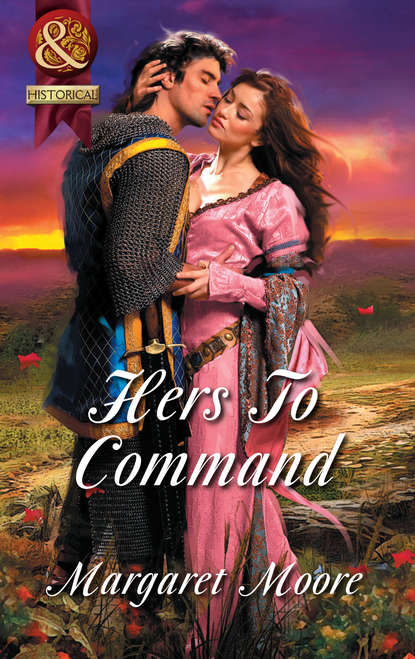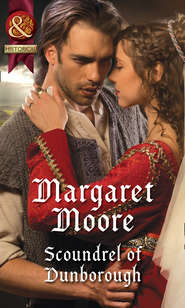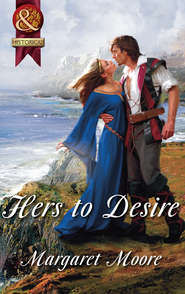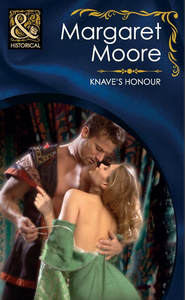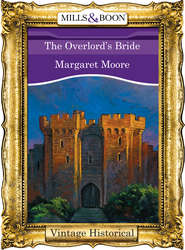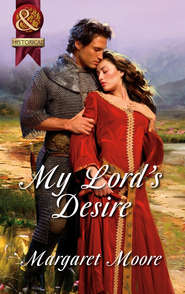По всем вопросам обращайтесь на: info@litportal.ru
(©) 2003-2024.
✖
Hers To Command
Настройки чтения
Размер шрифта
Высота строк
Поля
“God help me, I do, and I hate the knave.”
Sweeping the sheet behind him as a lady would the skirt of her gown, the knight strode to the table. He picked up the wineskin lying there and lifted it over his mouth, shaking out the last few drops.
Mathilde glanced at Giselle. If this man truly hated Roald… “Why do you dislike him?”
“As there is a lady present, I would rather not say,” the Norman replied as he tossed the empty wineskin back onto the table.
A lady? What did he think she was? “I am Lady Mathilde of Ecclesford,” she declared, “and this is my sister, Lady Giselle.”
The knight ran an incredulous gaze over her and her plain clothing. “You’re a lady? I took you for a servant.”
“Well, I am not.”
“Forgive me my mistake,” he replied, not very contritely, as his hand moved to his waist and the sheet wrapped around it.
“What are you doing?” she exclaimed, turning away.
“I want to hear more about your dilemma, so I think I should dress. Don’t you agree?”
It would be much easier to talk to him if he were dressed, so she didn’t disagree. However, since there was no reason for them to be here while he put on his clothes and indeed, every reason they should not—she retrieved her dagger and started sidling toward the door. Unfortunately, Giselle was apparently fascinated by the corner at which she stared and before Mathilde could catch her eye, the knight declared, “There. Now I am presentable.”
And so he was. He wore plain woolen breeches, a sleeveless leather tunic bound by a wide sword belt holding his scabbard and broadsword over a white shirt loosely tied at the neck. He’d put on a pair of boots that were certainly not new, although they were polished and well cared for.
Without the distraction of his near nudity, Mathilde focused on his handsome face and intelligent brown eyes—when she should be thinking only of how, and if, this man could help them.
Determined to do just that, she said, “We may be related to Roald, but I assure you, he is no dearer to us than he is to you, and not just because we dread what he may do. He has done great harm in the past, and we fear he will do more in the future. He has no honor, or kindness, or mercy.”
“That sounds like the Roald I know,” the Norman agreed.
“Our father died a short time ago,” she continued, a slight catch in her voice, for her grief was still raw. “In his will, he left Ecclesford to Giselle and me, the land to be divided equally between us, with a small sum of money for Roald.
“However, there are still many who believe inheritance should follow the male line above all other concerns. Then Roald should be lord of Ecclesford, and I am certain he will argue so, and try to steal our inheritance away.”
“And likely marry you off to form alliances to his advantage,” the knight added, proving that he knew about Roald’s greed and ambition. “So you want a knight to scare him off and stop him from making any such claim, is that it?”
“Yes. We were told you are the brother of the lord of Dunkeathe in Scotland, and the boon companion of the lord of Tregellas of Cornwall. Is that true?”
“I have that honor, yes,” the knight replied with a courteous bow, smiling in a way that made him look more handsome still. “As it happens, my lady, I have no particular calls upon my time at present and indeed, it would be my pleasure to thwart any plans of Roald de Sayres. Therefore, since it’s also my duty as a knight of the realm to help ladies in distress, I will gladly assist you. And of course, as I am an honorable knight, I would not expect to be paid.”
“Then, Sir Knight—”
“Mathilde,” Giselle interrupted. “May I have a word with you? Alone?”
Mathilde was not pleased by the amusement in the knight’s brown eyes that appeared when he heard Giselle’s request, but she wasn’t willing to ignore her sister’s plea. “Of course,” she said, moving to the door.
Giselle eagerly followed. Once on the stairs, Giselle stopped when they were halfway to the taproom, as if she couldn’t wait to speak any longer. “Mathilde, surely we need not decide about this knight right now, or even today. Let us think on it some more.”
“He might not be here tomorrow—and what more is there to think about?” Mathilde replied, once again struggling to control her impatience. “How many other knights with such associations are likely to ride through this county in the next few days? How many others will hate Roald as he does?”
“We still know very little about him,” Giselle protested. “We don’t even know his name.”
Good God, Giselle was right. Still, that was not so important as his connections. “Whatever this Norman’s name may be, we should accept the aid he offers.”
Giselle’s gaze went from wary to searching. “He’s a very handsome fellow.”
Mathilde couldn’t blame Giselle for her unease. She had good cause to doubt Mathilde’s judgment when it came to men, and this one was very handsome and charming and probably persuasive. Even so, Giselle should also believe she had learned from her mistake.
“Have no fear, Giselle,” Mathilde assured her. “I will be on my guard, as I’m sure you will be, and if it seems he is not behaving as a noble guest should, we can ask him to leave. Now will you accept his help?”
Although she looked far from certain, Giselle sighed and said, “Since I can think of no better plan myself, I will agree—with the understanding that if I think he should leave, you will not argue with me until I cannot think straight.”
Mathilde embraced her sister. “I promise.”
When they returned to the chamber, they found the knight sitting on the bed, one ankle on his knee, whistling a merry and rather complicated little tune. He rose when they entered and gave them another smile. “So, what is it to be? Do I go to Ecclesford or not?”
“Yes, if you will, Sir…?”
He laughed and made a sweeping bow. “Egad, forgive my lack of manners! I can only plead the unusual nature of our meeting. I am Sir Henry D’Alton, knight of the realm, sworn protector of women and children, guardian of the faith, brother of Nicholas of Dunkeathe, brother-in-law of the chieftain of Clan Taran and sworn comrade-in-arms of Lord Merrick of Tregellas.”
His connections were even more significant than Mathilde had been told and she was duly awed. Nevertheless, he looked so pleased with himself as he rattled them off, she was tempted to take him down a peg. But, since he’d agreed to help them, she didn’t. “Most impressive, Sir Henry. If you will gather your things, our escort is in the yard awaiting us.”
“Please ask the innkeeper to have Apollo saddled,” he said, opening the door for them, “and for a crust of bread for me to eat along the way, if you intend to leave immediately.”
“We do.” Indeed, the sooner they were back home, the better she would feel. Although they had no such word, it was possible Roald had come while they were away.
Sir Henry’s lips curved up into a smile. “I can hardly wait to see the look on Roald’s face if he comes to your castle and finds me there.”
Mathilde made no response as they hurried past him, but in truth, she would far rather never see Roald again, and fervently hoped all her precautions would prove pointless.
WEAVING THEIR WAY through scratching chickens, waddling geese and puddles left from last night’s rain, with a gray sky threatening more rain overhead, Mathilde and her sister headed toward their escort. Some of the soldiers leaned against the wattle and daub walls of the stable; others sat on the end of a hayrick. A few had hunkered down in a dry spot under the eaves, and all held cups of ale the innkeeper must have provided them.
Cerdic spotted them first. Barking an order to the rest of the men, their muscular friend set his ale down on a nearby barrel while the other soldiers scrambled to their feet or jumped from the hayrick and prepared to depart.
Like the knight, the tall, blond Cerdic was also a fine example of a warrior: broad shouldered, narrow hipped, with powerful arms and legs. Like many of his Saxon ancestors, he was an expert with the battle ax and if he wasn’t as handsome as Sir Henry, he was hardly homely. His strong features were framed by thick hair that hung past his shoulders. He wore a leather tunic loosely laced and his breeches were of leather, too. His dark cloak was held closed by a large, round bronze brooch that had been his father’s, and his father’s before him. He had the fur of a wolf wrapped around his booted shins, tied on with thin leather strips. All in all, he was an imposing figure.
“It is just as Rafe told us,” Mathilde said with a smile when they reached him. “The Norman knight is the brother of a powerful man in Scotland, the brother-in-law of another, and the friend of the lord of Tregellas in Cornwall. Even better, Sir Henry has agreed to help us.”
Cerdic frowned, for like Giselle, he had never been enthused about Mathilde’s plan. “What wilt thou do if this Sir Henry does not send Roald running off like a hound with its tail between its legs?” he asked, his French tinged with the accent of his people.
Although she had not expected otherwise, his disapproval stung nonetheless. “I don’t question your skill as a warrior, Cerdic,” she replied with a hint of pique. “I wish you would not be so quick to question my plan, especially when I hope it will spare the lives of many of the garrison. But rest assured, if my plan fails and we must fight, I know our men will not fail us.”
That brought a smile to Cerdic’s face, until he caught sight of Sir Henry sauntering toward them, his shoulders rolling with his easy, athletic strides. He wore a thick black cloak and carried a large leather pouch thrown over his shoulder. From inside it came the clink of metal—his chain mail and other armor, she supposed.
“Thou thinkst that little man is going to frighten Roald?” Cerdic asked with amazement.
Only Cerdic would think Sir Henry “little.” To be sure, the Norman was lean, but there was plenty of muscle on his slender frame, as she well knew, and while Sir Henry was not as tall as Cerdic, he was taller than most of their soldiers, especially the dark-haired Celts.
“If not the man himself,” she replied as she looked back to Cerdic, “then his family and friends.”





